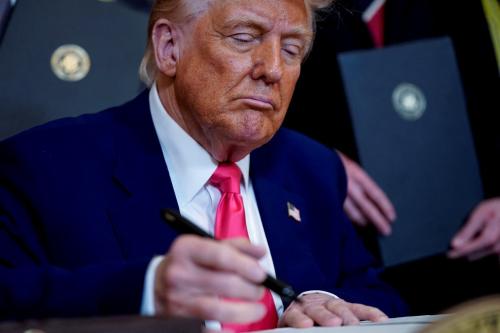This is a Brookings Center on Regulation and Markets working paper.
SUMMARY
Climate policy has entered a new era as public investment increasingly moves to center stage. While essential for decarbonization, public investment is not enough—the carrots of investment need to go hand in hand with regulatory sticks. Public investment in clean technologies and infrastructure does not guarantee decarbonization outcomes. Yet, comprehensive climate policy, particularly high and comprehensive carbon prices, has remained elusive in the United States. Against this backdrop, the public investment push offers a political opportunity of government leverage. Governments can tie climate requirements to public investment as part of a “green bargain.” At the core of these arrangements is reciprocity—linking carrots to sticks—to ensure public investment leads to technological change and emission reductions. Drawing on the experience of late industrializers with “reciprocal control mechanisms,” this report advances our understanding of how to tie climate requirements to public investment. It introduces a typology of different types of green bargains, offers an empirical overview of green bargains, and recommends design choices—relating to government leverage, scope of climate requirements, and accountability—to make green bargains effective policy tools.
Download the full working paper here.
The authors received support from The Hewlett Foundation for this work. Other than the aforementioned, the authors did not receive financial support from any firm or person for this article or from any firm or person with a financial or political interest in this article. The authors are not currently an officer, director, or board member of any organization with a financial or political interest in this article.
The Brookings Institution is committed to quality, independence, and impact.
We are supported by a diverse array of funders. In line with our values and policies, each Brookings publication represents the sole views of its author(s).






